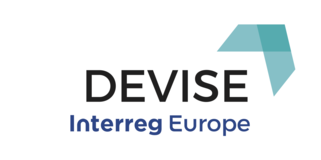Interreg Europe awarded the DEVISE partnership with an extension of one year to complete some additional activities (COVID-19 Regional Context Assessment in relation to digital transformation of targeted SMEs and some successful COVID-19 good practices package production) that will contribute to the improvement of the policy instruments addressed by the project partners and to develop new learning experiences in the context of COVID-19.
We continue our virtual learning in Ireland, where DEVISE lead partner the ERNACT network and Northern and Western Regional Assembly have been working together in the COVID-19 Regional Context Assessment. According to this research, 43% of Irish SMEs claim they could not have functioned productively without investment in technology during the pandemic. The main areas of investment of Irish SMEs during the pandemic were: IT hardware or infrastructure (32%), IT software and applications (31%), followed by cloud storage or services (12%) and E-commerce and marketplace technologies (12%). Nevertheless, they faced different challenges in the process such as lack of awareness and skills (management skills in particular) and the ‘fear factor’ related to digitalisation.
Regarding the support measures that were put in place during the pandemic years, interviewed SMEs confirmed that existing innovation and trading online voucher schemes were effective and flexible. In reference to the skills, the development of local mentorship programmes was discussed, where entrepreneurs are helped to articulate their needs and identify solutions. In this context, DEVISE partners found some opportunities for new policy instruments. For example, the need for approaching SME digitalisation through clusters and digital/innovation hubs was widely acknowledged as crucial. Furthermore, policy approaches should consider SME digitalisation needs as well as the differences among them.
The Irish partners in the DEVISE project, ERNACT and NWRA, welcomes the Irish Government's new national digital strategy entitled ‘Harnessing Digital – The Digital Ireland Framework’. This new strategy will support SMEs with their Digital Transformation by providing grants and assistance, with a target of 90% of SMEs at basic digital intensity by 2030 and 75% enterprise take-up in cloud, AI and big data. This digital strategy also aligns with both EU priorities, under the Digital Decade, and national priorities, under the 2021 Economic Recovery Plan and Ireland’s National Recovery and Resilience Plan.
Good practices in Border Midland and Western Region
Daniela Copaci, ERNACT Programme Manager and Patrick Devine, EU Projects Officer at NWRA, have identified two interesting good practices. The first is Enterprise Ireland’s Digitalisation Voucher. The objective of the Digitalisation Voucher is to help companies prepare a plan for the adoption of digital tools and techniques across the business. Process Optimisation, Digital Customer Experience and Data Management will be essential in order to remain competitive post COVID-19. With that, the risks associated should always be considered, ensuring that Cyber Security is at the forefront of any digital plan. The Digitalisation Voucher is open to companies that operate within the manufacturing or internationally traded service sectors who employed 10 or more full time people on their payroll on the 29th of February 2020 OR employed 10 fulltime staff at the time of application.
The second selected good practice was Donegal County Council’s Remote Working Strategy which includes workspaces (accessible and affordable co-working spaces including digital hubs); promotion of the region as a great location for remote working; support for both employers and employees; talent (by mapping talent and skills availability in the region) and infrastructure and connectivity (showcasing the availability of good quality infrastructure such as broadband, mobile phone coverage, childcare services, education, housing, recreational amenities, libraries, cultural services and so on).
The actions which support digitalisation of SMEs are funded by different sources including existing programmes run by organisations like Donegal County Council, Údarás na Gaeltachta, Enterprise Ireland and other public-private initiatives. “Success is evident in that this strategic framework is supported by an annual action plan with strong support from the local ecosystem”, adds Daniela. The continuing promotion of remote working facilities and individuals based in Donegal via online and social media has generated huge engagement on a national and international scale. “Two ‘Grow Remote Chapters’ have been established and additional funding obtained for Donegal Hubs development, both supported by the strategy are evidence of its success”, she concludes.
Image from Donegal County Council's Remote Working Strategy.











